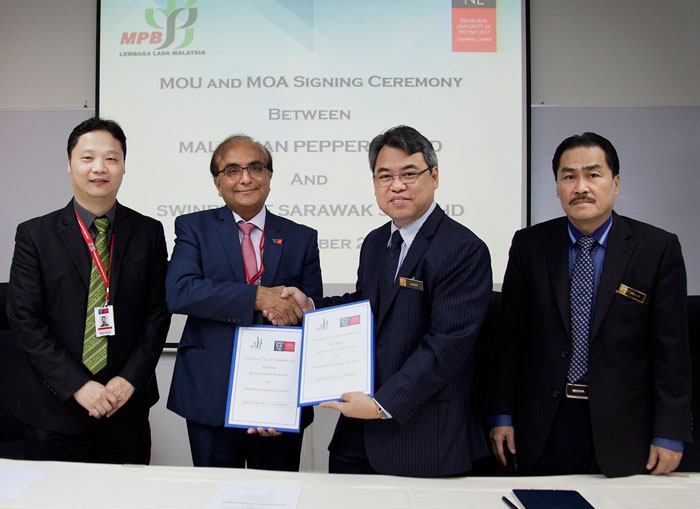KUCHING – The Malaysian Pepper Board (MPB) and Swinburne University of Technology Sarawak Campus are to jointly develop a chemical sensor that could identify the geographical origins of pepper.
The partnership was formalised with the signing of a memorandum of agreement at Swinburne Sarawak, on 21 November.
The research will involve the profiling of pepper from Sarawak and other parts of the world, with the information obtained to be utilised for the development of the chemical sensor.
“The sensor could identify if a sample is actually grown in Sarawak or elsewhere. This is especially important as there is now a lot of imported pepper in the market,” said Dr Ng Sing Muk, an expert in sensor technology from Swinburne Sarawak who is leading the project.
Due to be completed by the end of 2020, the project is funded by the MPB with Swinburne Sarawak providing the expertise in sensor technology, he said.
“It is hoped that the outcome of this three-year project will assist the state in protecting the geographical status of Sarawak pepper,” said Swinburne Sarawak Acting Deputy Vice-Chancellor and CEO, Professor Ajay Kapoor, at the signing ceremony.
Both organisations also signed a memorandum of understanding yesterday to look into student placements and internships for Swinburne Sarawak biotechnology students with the MPB, staff development, as well as research and development initiatives.
“In our partnerships with business and industry, the opportunity to develop the skills and knowledge of our students is our priority,” said Professor Ajay.
He said that as a university of international standing, Swinburne Sarawak is committed to supporting and providing its students with the best opportunity to acquire the expertise and experience to succeed in their career.
MPB Director-General Dr Harry Entebang said that the latest collaboration with the university “is a significant milestone in our initiative to bring the development and growth of the industry to another level of height. At the same time this is in line with our strategic direction to ensure the industry remains sustainable and competitive.”
Last year, MPB and Swinburne Sarawak had also entered into an agreement to look into increasing pepper production and combating pests and diseases that affect the pepper plant.
“It is our hope that through this collaboration, Swinburne will become one of the key partners in helping MPB to be the world’s top quality pepper producer,” Dr Harry said.
He added that the Sarawak Pepper Farm project was launched in Bintulu last month as a result of a strategic collaboration between the MPB, Universiti Putra Malaysia (UPM), Ministry of Education, Science and Technological Research.
The project involves five acres for research, 15 acres for commercial production, and five acres for community plantation. The research focuses on pepper planting, production, downstream technology, and humanity dimension to be led by UPM and the MPB.
“We believe Swinburne Sarawak can also participate in this collaboration,” Dr Harry said.


